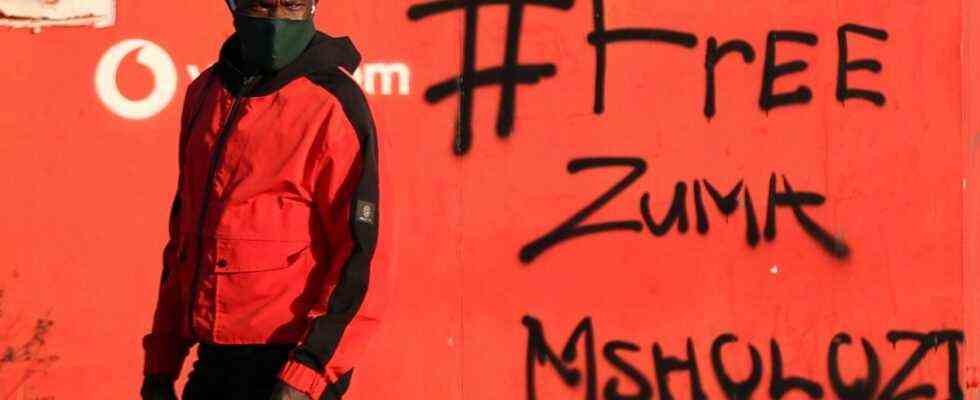It was six days in hell, says Nhlanhla Lux Dlamini, a member of the council of Soweto, the largest township in South Africa. For six days, Dlamini and a few other residents defended the Maponya Mall, one of the largest shopping centers in Soweto, and arguably the only one that was not ravaged by looters in the past week. Probably tens of thousands had devastated shops, factories and logistics centers in the provinces of Gauteng and KwaZulu-Natal, particularly the township of Soweto and the coastal city of Durban.
It was the worst wave of violence that South Africa has experienced since the end of apartheid almost thirty years ago. 212 people have died and more than 3000 violent criminals have been arrested. The damage runs into billions of euros, and in some regions food and petrol are still in short supply.
President Cyril Ramaphosa visited the affected areas over the weekend, meeting with those who are now cleaning up or defending their businesses. During the President’s visit, Nhlanhla Lux Dlamini told news24 news portal: Many young people who took part in the looting have now apologized. “Their heads have been infiltrated.” An “unknown enemy” incited people in the townships to plunder. The big question is whether the enemy is actually unknown. Or is it an old friend? Isn’t the violence primarily the result of the escalated power struggle within the ruling ANC?
The President speaks of an attempted coup
President Ramaphosa called the riots and looting a “targeted, coordinated and well-planned attack on democracy”. Ultimately, it was an attempted “overthrow”. He did not give names. One of his closest employees spoke of twelve suspects who are said to have been instrumental in coordinating the unrest. These began on Thursday, the day after former President Jacob Zuma began his 15-month prison sentence.
Zuma had refused to appear before a commission of inquiry into the corruption during his tenure. In the nine years at the helm of the state, he and his clique had stolen billions and plundered state-owned companies such as the energy company Eskom and the airline South African Airways. Zuma has many supporters, especially in his home region of KwaZulu-Natal, some like his folk manner, others benefit from his patronage network, from small or large gifts.
On Thursday, his supporters had started setting fire to trucks on the motorway to Johannesburg. Then the looting began. In the beginning there were only small shops, the targets got bigger and so did the number of looters. There were real traffic jams in front of logistics centers in the Durban region because so many came by buses and taxis to empty the shops.
“Not sporadically and not spontaneously”
“You can see that this operation was planned by people who have done this before. It is not sporadic and not spontaneous. So there are suspicions that people were paid,” said Zizi Kodwa, deputy minister for state security. The procedure reminds him of the tactics of Umkhonto we Sizwe, the armed arm of the ANC, who tried to destabilize the state with attacks during the apartheid period. The Association of Veterans of the Liberation Struggle is one of President Zuma’s closest supporters. The veterans had already warned in December that one should treat Zuma with care, otherwise a “coup” could happen.
Last week’s violence is now pretty close. Not only was it looted, but the state’s infrastructure was deliberately destroyed: More than 100 cell phone masts were attacked, water treatment plants, hospitals and at least 30 schools. South African media have identified numerous WhatsApp groups in which Zuma calls for violence on people close to Zuma and provides detailed targets.
The planned riots eventually got out of hand as more and more people joined the looters. Because they didn’t have enough to eat. Or because they wanted a television like the one the neighbor had just brought in.
Meanwhile, there also seems to be a hangover mood among many looters, the extent of the violence was shocking and also deterring for many South Africans. Before the riots started, the ANC is said to have been considering negotiating an early release or house arrest for Zuma, which now seems unthinkable. “You can’t discuss this while the country is on fire,” a senior ANC official told the weekly Mail & Guardian.
Another corruption process was negotiated against Zuma on Monday. These are crucial days for South Africa, the question is whether the culture of impunity that has plagued the country for years will end. In recent years, President Cyril Ramaphosa has embarked on an arduous process of rebuilding the police and prosecutors, which had been systematically eroded during the Zuma years in order to plunder the country undisturbed.
Some of Zuma’s people are still part of the authorities and the government and have not yet given up the fight. State Security Minister Ayanda Dlodlo said there had been no attempted coup and criminals had hijacked a legitimate issue. She belongs to the Zumas camp and is still in the cabinet mainly because President Ramaphosa wants to rid the country of corruption, but in no way endanger the unity of the ANC. The question is whether he can continue to make such concessions in the future. Otherwise the ANC may not break apart, but the whole country will.

